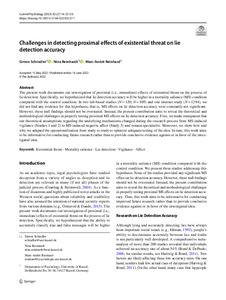| dc.date.accessioned | 2023-10-18T12:09:15Z | |
| dc.date.available | 2023-10-18T12:09:15Z | |
| dc.date.issued | 2022-06-14 | |
| dc.identifier | doi:10.17170/kobra-202310188868 | |
| dc.identifier.uri | http://hdl.handle.net/123456789/15113 | |
| dc.description.sponsorship | Gefördert im Rahmen des Projekts DEAL | ger |
| dc.language.iso | eng | |
| dc.rights | Namensnennung 4.0 International | * |
| dc.rights.uri | http://creativecommons.org/licenses/by/4.0/ | * |
| dc.subject | Existential threat | eng |
| dc.subject | Mortality salience | eng |
| dc.subject | Lie detection | eng |
| dc.subject | Vigilance | eng |
| dc.subject | Affect | eng |
| dc.subject.ddc | 150 | |
| dc.title | Challenges in detecting proximal effects of existential threat on lie detection accuracy | eng |
| dc.type | Aufsatz | |
| dcterms.abstract | The present work documents our investigation of proximal (i.e., immediate) effects of existential threat on the process of lie detection. Specifically, we hypothesized that lie detection accuracy will be higher in a mortality salience (MS) condition compared with the control condition. In two lab-based studies (N = 120; N = 109) and one internet study (N = 1294), we did not find any evidence for this hypothesis, that is, MS effects on lie detection accuracy were constantly not significant. However, these null findings should not be overstated. Instead, the present contribution aims to reveal the theoretical and methodological challenges in properly testing proximal MS effects on lie detection accuracy. First, we make transparent that our theoretical assumptions regarding the underlying mechanisms changed during the research process from MS-induced vigilance (Studies 1 and 2) to MS-induced negative affect (Study 3) and remain speculative. Moreover, we show how and why we adapted the operationalization from study to study to optimize adequate testing of the idea. In sum, this work aims to be informative for conducting future research rather than to provide conclusive evidence against or in favor of the investigated idea. | eng |
| dcterms.accessRights | open access | |
| dcterms.creator | Schindler, Simon | |
| dcterms.creator | Reinhardt, Nina | |
| dcterms.creator | Reinhard, Marc-André | |
| dcterms.extent | Seiten 22114-22126 (13 Seiten) | |
| dc.relation.doi | doi:10.1007/s12144-022-03237-1 | |
| dc.subject.swd | Sterblichkeit | ger |
| dc.subject.swd | Sterbeziffer | ger |
| dc.subject.swd | Lügendetektor | ger |
| dc.subject.swd | Aufmerksamkeit | ger |
| dc.subject.swd | Affekt | ger |
| dc.type.version | publishedVersion | |
| dcterms.source.identifier | eissn:1936-4733 | |
| dcterms.source.issue | Issue 25 | |
| dcterms.source.journal | Current Psychology | eng |
| dcterms.source.volume | Volume 42 | |
| kup.iskup | false | |


